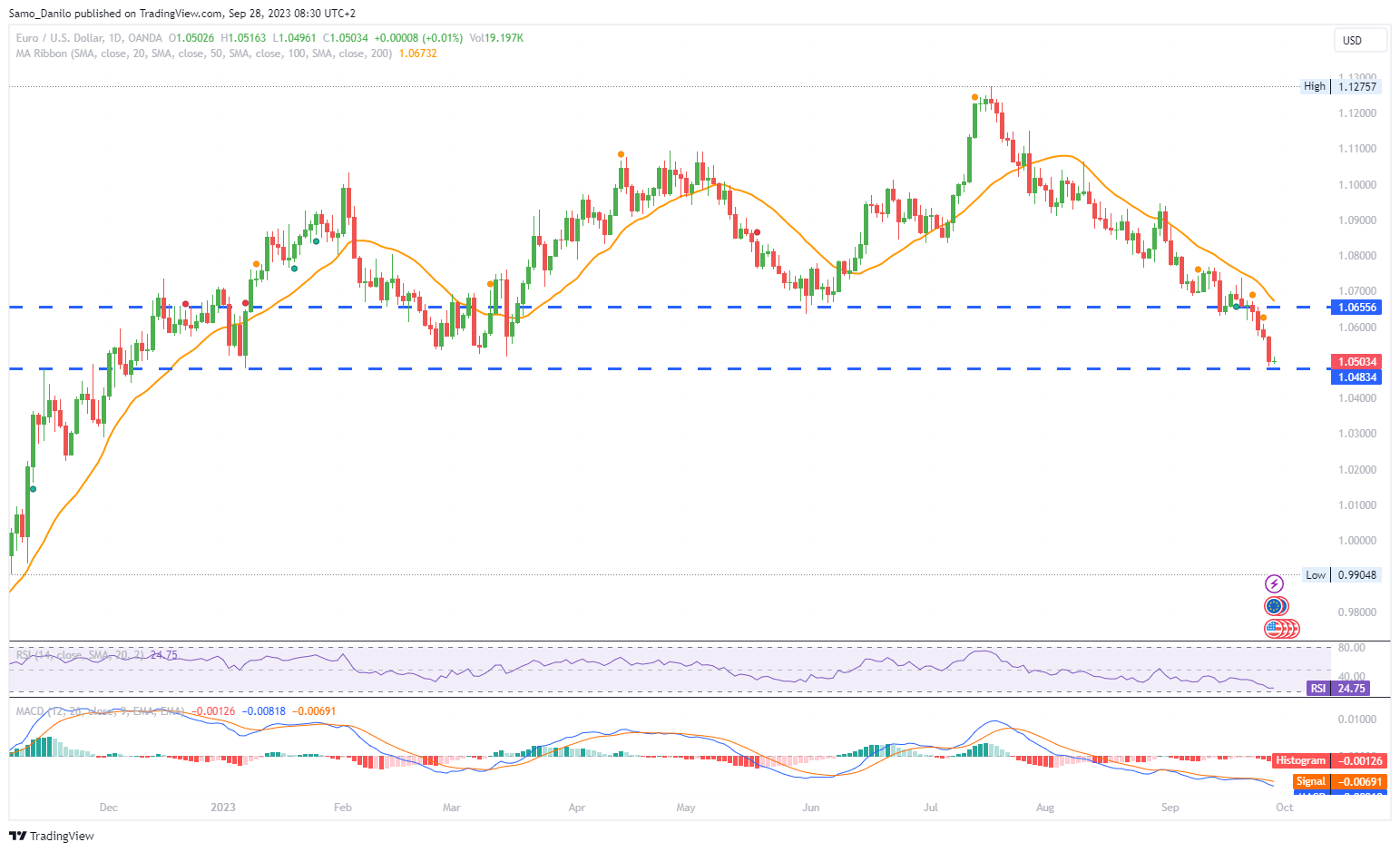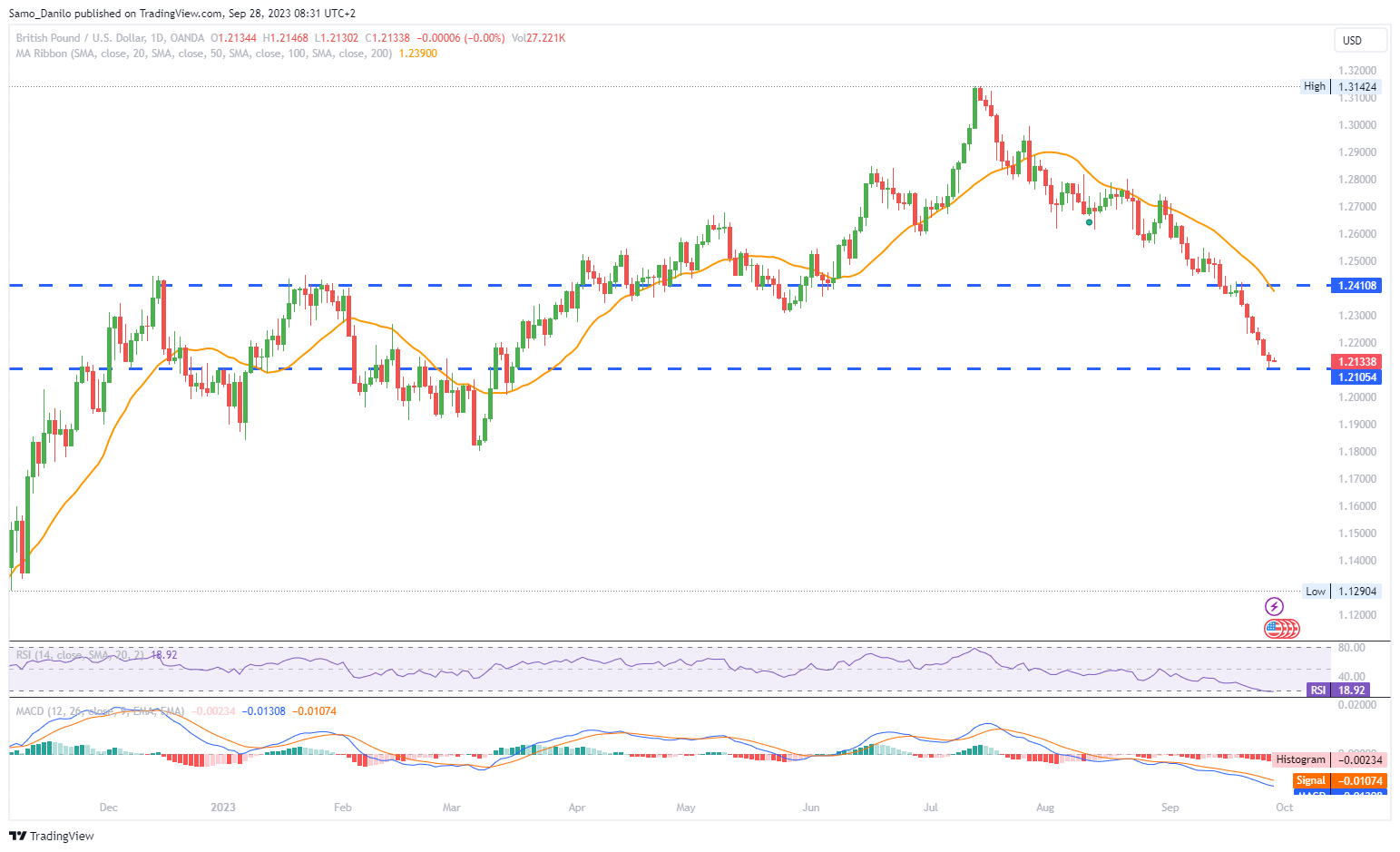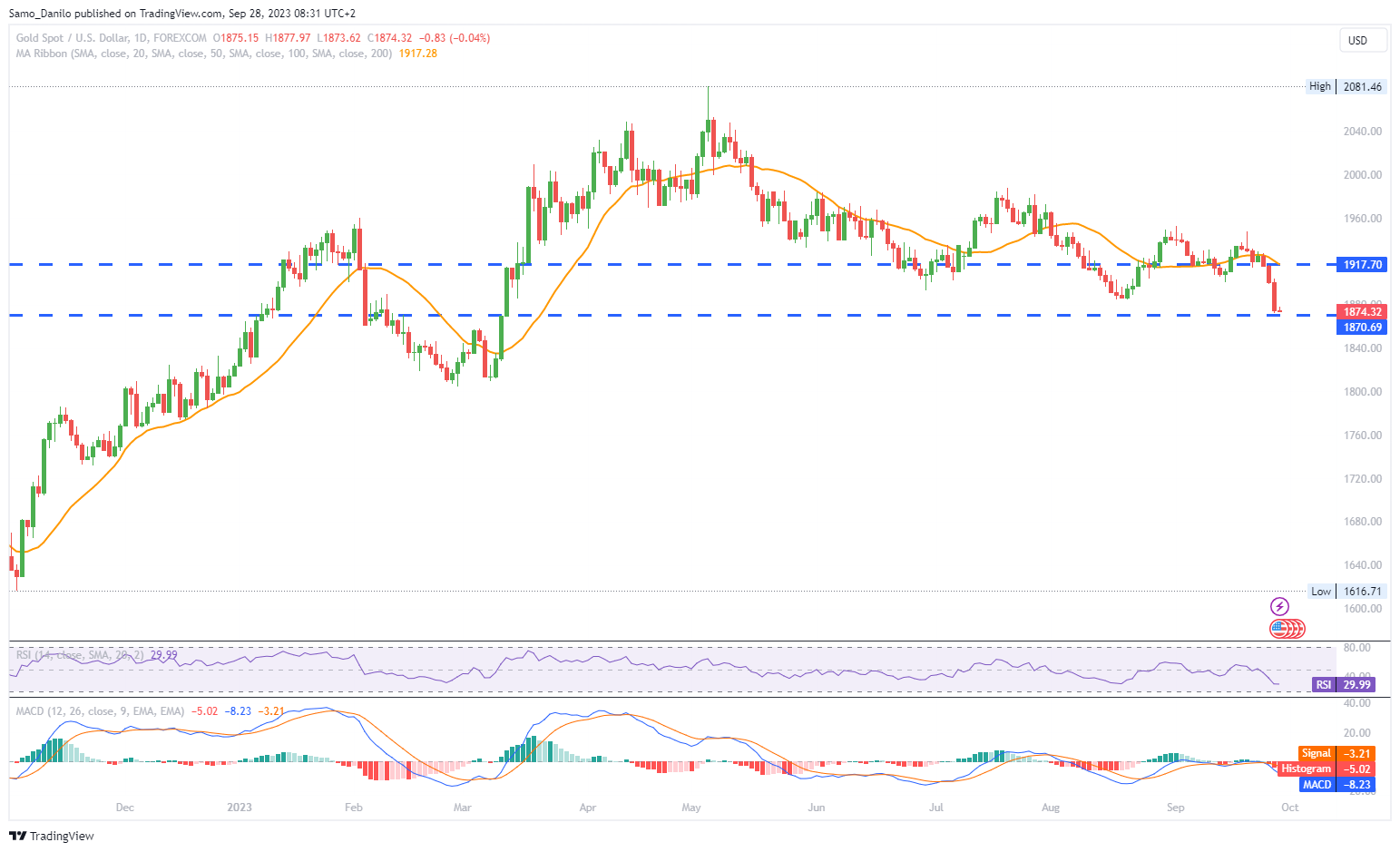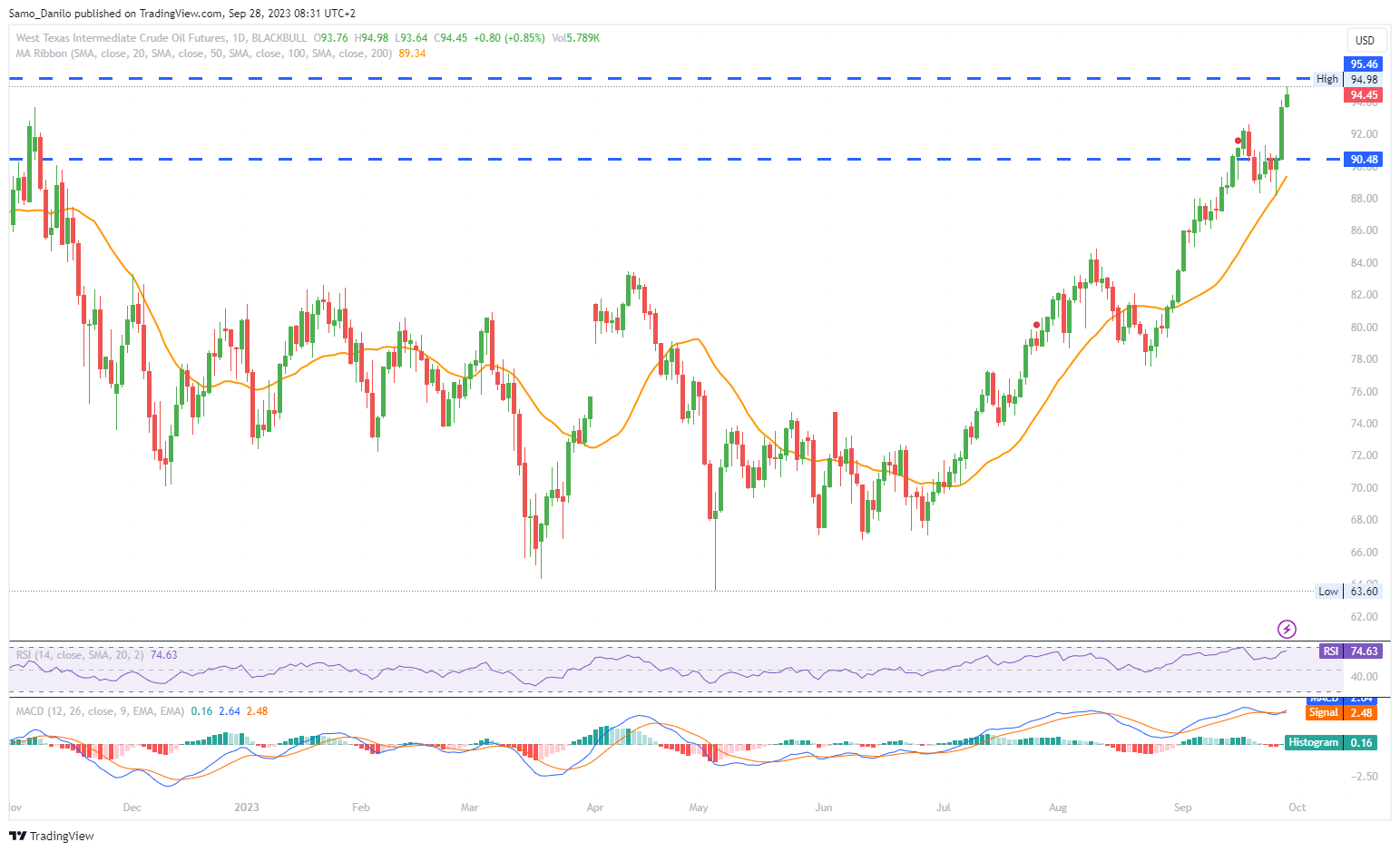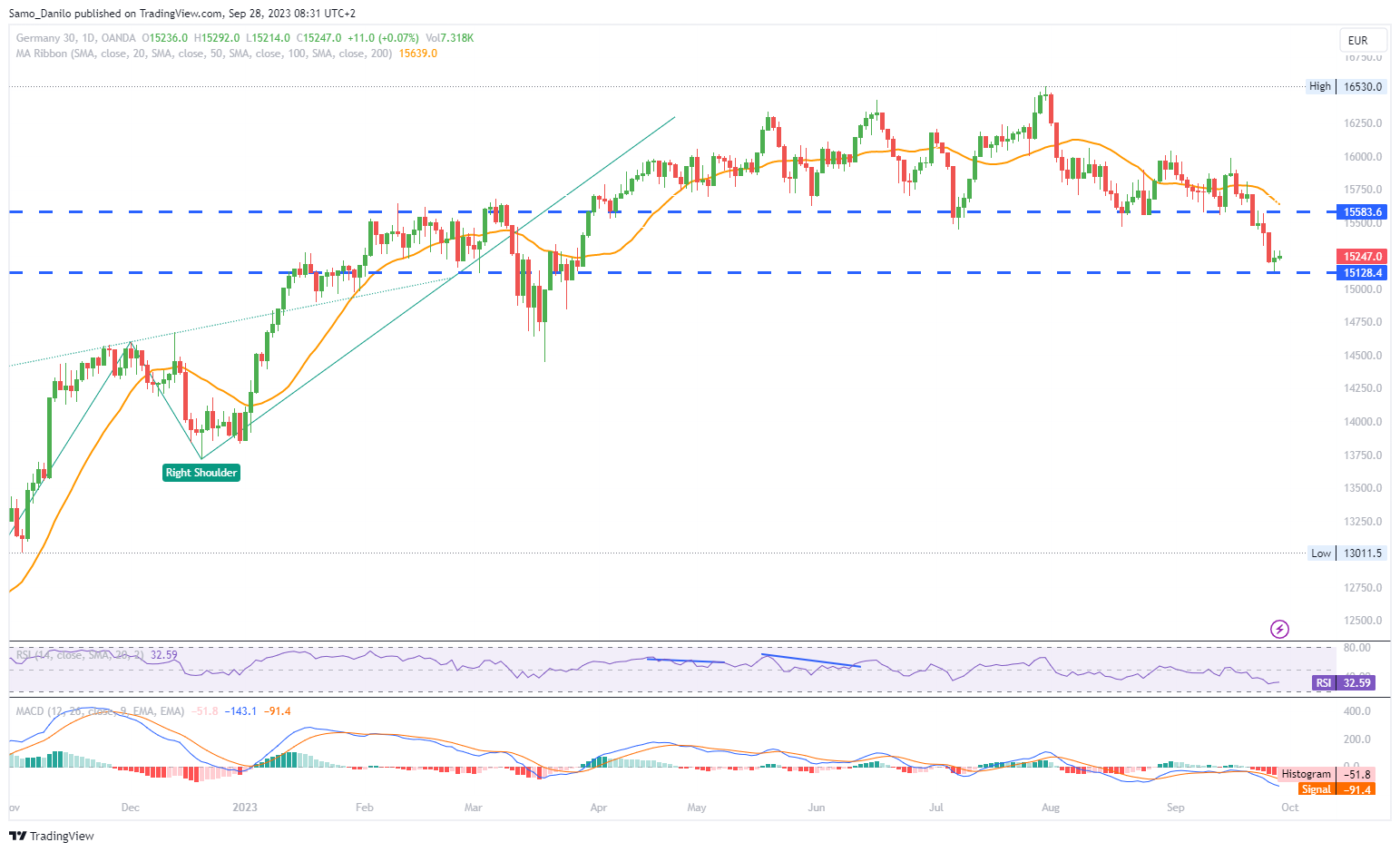EURUSD
- The EUR/USD pair has faced significant downward pressure, marking its seventh consecutive day of decline. It has now reached its lowest level since January and is trading below the key psychological level of 1.0500.
- Despite comments from members of the European Central Bank (ECB), the market has shown limited response. The ECB's stance continues to be data-dependent, and upcoming inflation figures are expected to play a critical role in shaping expectations regarding monetary policy.
- The overall bias for the EUR/USD remains tilted to the downside, with no clear signs of a corrective move in the near term. The pair's prolonged decline reflects the prevailing bearish sentiment.
- Market sentiment, as well as upcoming inflation data from Spain and Germany, will be closely monitored. These figures, scheduled for release on Thursday, could have a significant impact on market dynamics.
- Additionally, Eurozone Consumer Price Index (CPI) data from Eurostat, due on Friday, will be crucial. Persistent evidence of inflationary pressures could put the ECB in a challenging position as it balances the need for tighter monetary policy with a deteriorating economic outlook marked by declining confidence.
Closing statement: The EUR/USD pair has been on a sustained downward trend, reaching multi-month lows. The ECB's data-dependent approach and upcoming inflation data will be key factors influencing the pair's direction. Traders will closely analyse the inflation figures and monitor market sentiment for any signs of a potential reversal.
GBPUSD
- GBP/USD is experiencing persistent selling pressure, with the pair trading around 1.2140 after bouncing off a low not seen since March 17 at 1.2110. The pair currently remains below both the 50-hour and 100-hour Simple Moving Averages (SMAs).
- The Relative Strength Index (RSI) indicates oversold conditions, suggesting that the pair may have reached a point where it could see a potential rebound. However, it's important to note that being oversold doesn't guarantee an immediate reversal.
- A significant factor contributing to GBP/USD's weakness is the divergence in monetary policy between the Bank of England (BoE) and the Federal Reserve (Fed). The BoE has taken a pause in its rate hike cycle, while the Fed continues to signal a more hawkish stance.
- The strength of the US Dollar is a primary driver of GBP/USD's decline. The US Dollar Index has reached levels not seen since November, nearing the 107.00 mark.
- Recent economic data released on Wednesday showed an unexpected increase in Durable Goods Orders for August, contradicting expectations of a decline. Economic data releases can have a significant impact on currency pairs.
- On Thursday, traders will closely watch the weekly Jobless Claims report, a revised reading of Q2 GDP growth, and Pending Home Sales data. These releases can provide further insights into the economic conditions in the US.
| SMA (20) | Falling |
|
|
| RSI (14) | Falling |
|
|
| MACD (12, 26, 9) | Falling |
|
|
Closing statement: GBP/USD remains under selling pressure due to the divergence in monetary policy and the strength of the US Dollar. While oversold conditions may hint at a potential rebound, traders will closely monitor economic data releases for further direction.
GOLD
- Gold price is struggling to recover after hitting its lowest level since mid-March, reaching $1,873 on Wednesday. This suggests significant selling pressure in the gold market.
- Despite the decline in equity prices, US Treasury yields, especially the 10-year yield, remain near recent highs, reaching 4.64%. High yields on government bonds can make non-yielding assets like gold less attractive to investors.
- A surprise rebound in demand for US Durable Goods Orders in August signals economic resilience, which has been supportive of the US Dollar. The US economy's strength can put downward pressure on gold prices.
- Reuters reported that there are concerns about a potential government shutdown in the US, as Republican US House Speaker Kevin McCarthy rejected a stopgap funding bill. This adds an element of uncertainty to financial markets.
- Traders are closely watching the US Q2 GDP revision, Jobless Claims, and Pending Home Sales for fresh market direction. Economic data releases often influence gold prices.
| SMA (20) | Slightly Falling |
|
||
| RSI (14) | Falling |
|
|
|
| MACD (12, 26, 9) | Slightly Falling |
|
Closing statement: Gold price is struggling near multi-month lows as factors like high US Treasury yields, signs of US economic resilience, and potential government shutdown concerns weigh on the precious metal. Traders are awaiting key economic data releases for further guidance on gold's direction.
CRUDE OIL
- WTI Crude Oil prices have been showing strength recently, with a three-day rally pushing prices higher beyond $94 per barrel. This comes after a rebound from the mid-$88.00s.
- The US Energy Information Administration (EIA) released data indicating a more-than-expected decline in US crude oil inventories for the week ending September 22. This draws attention to potential supply constraints, which can support oil prices.
- There is optimism surrounding China's economic recovery, which is acting as a positive factor for oil prices. China, as the world's largest oil importer, plays a significant role in global oil demand.
- Fuel demand in China is expected to rise during the week-long Autumn festival holiday, starting on Friday. This anticipated increase in demand is another supportive factor for oil prices.
- While the outlook for oil prices is positive, it's worth noting that overbought conditions on the daily chart could potentially limit further gains. Traders may keep an eye on technical indicators for potential signs of exhaustion.
| SMA (20) | Rising |
|
|
| RSI (14) | Slightly Rising |
|
|
| MACD (12, 26, 9) | Slightly Rising |
|
Closing statement: Crude oil prices have been on the rise, supported by a decline in US inventories, optimism about China's economic recovery, and increased fuel demand in China during the upcoming holiday period. However, overbought conditions on the charts could pose a limitation on further gains.
DAX
- The DAX index experienced a decline of 0.25% on Wednesday. This decline was influenced by concerns about a potential economic recession, which weighed on investor sentiment.
- Market sentiment regarding the European Central Bank's (ECB) monetary policy goals continued to impact investor appetite. There are ongoing expectations that the ECB will maintain higher interest rates for an extended period, which has been a headwind for the market.
- On Thursday, Spain and Germany are set to release their respective inflation figures. Expectations include a rebound in Spain's annual consumer inflation rate and a significant decline in Germany's Consumer Price Index (CPI). It's important to note that a substantial drop in Germany's CPI may be necessary to significantly ease pressure on the ECB to maintain elevated interest rates.
- Additionally, investors should closely monitor any commentary from ECB officials. ECB Executive Board members Andrea Enria and Elizabeth McCaul are scheduled to speak, and any indications of a shift away from the current "higher-for-longer" script regarding interest rates could potentially ease selling pressure.
| SMA (20) | Slightly Falling |
| |
| RSI (14) | Slightly Falling |
|
|
| MACD (12, 26, 9) | Slightly Falling |
|
Closing statement: The DAX experienced a decline, with concerns about a potential recession and uncertainty about ECB monetary policy goals impacting investor sentiment. Inflation data from Spain and Germany, along with ECB commentary, will be closely watched for potential market-moving insights.
